

Can’t seem to fall asleep at night once again? Wondering if there’s something wrong with your sleep pattern? These days, there are a lot of ways for you to keep track of your sleep without having to use a smartwatch. One method is using a sleep-tracking app with advanced algorithms and sound detection.
In this guide, we’ll take you through the 5 best apps that can help you track your sleep, sleep smarter, and wake up feeling refreshed.
| App Name | Free/Paid | Tracking Method | Notable Features |
|---|---|---|---|
| ShutEye | Free & Paid | Sound-based | Snore detection, AI-powered insights, sleep sounds |
| Sleep as Android | Free & Paid | Motion & sound-based | Smart alarm, snore detection |
| Pillow | Free & Paid | Motion-based | Works with Apple Watch, records sleep sounds |
| Sleep Cycle | Free & Paid | Sound-based | Smart snooze function, tracks sleep patterns |
| SleepScore | Free & Paid | Sound-based | Detailed sleep analysis, personalized recommendations |
In the era of modern technology, millions of devices are created every year to improve or outperform old technology. These days, it’s increasingly common to find devices or apps that help you keep track of your activity levels and also your sleep schedule.
When it comes to tracking your sleep quality and sleep duration, there are many ways to do so. For example, using a wearable device such as a smartwatch or smart ring, or using an app that utilizes your phone’s sensors to detect sleep movements and patterns.
Wearing a smartwatch is a common way to track sleep, as many believe its sensors provide more accurate data. To some extent, this is true—since the watch remains in contact with your wrist, it can periodically measure your heart rate throughout the night.
As we sleep, our bodies cycle through different sleep stages, each playing a vital role in overall rest and recovery. The heart also follows these stages, with heart rate fluctuations indicating whether the body is truly resting or working harder than expected. While a wearable smartwatch can monitor your heart rate, it’s unable to capture other aspects of sleep data such as snoring, sleep talking, teeth grinding, or external noises that may affect your sleep quality. Thus, making it slightly inaccurate.
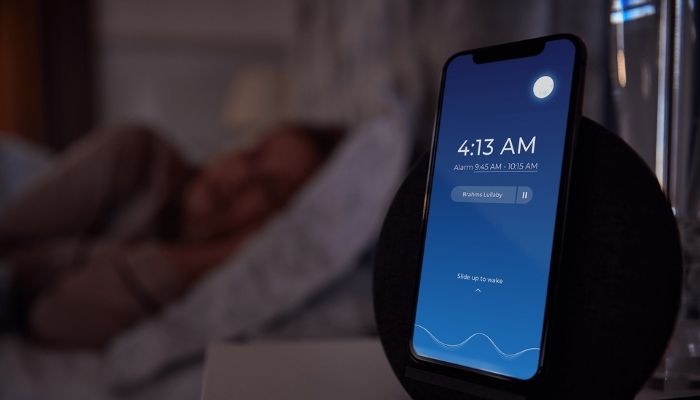
The best way to monitor sleep, in our opinion, is to use an app that can record sounds and monitor movements. These apps typically work by utilizing your phone’s microphone and it is probably the most convenient way.
You don’t have to think about your hand being restricted by a watch or wearable device throughout the night. Instead, you can simply place your phone on your bedside table or near your pillow, and the app will do the rest.
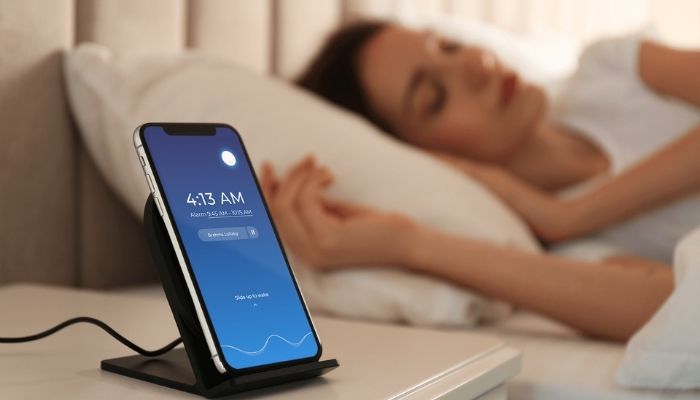
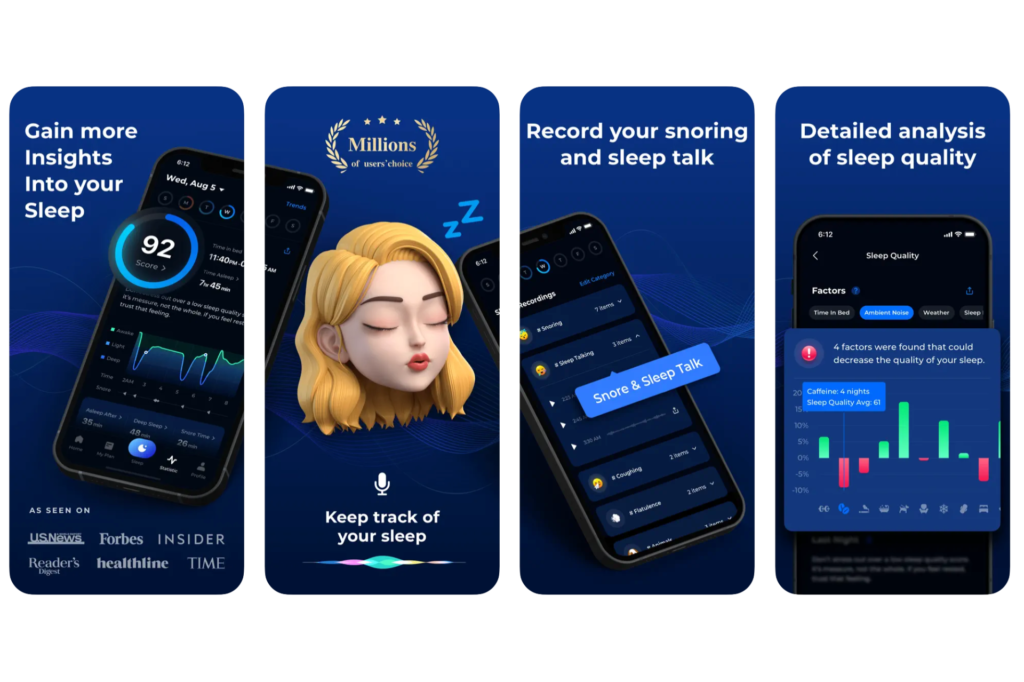
Used by over 40m+ people worldwide, with an average rating of 4.8 out of 5 stars on App Store, ShutEye® has proven to be a rather credible sleep app to use for sleep tracking purposes. The main reason why ShutEye works so well is that we use artificial intelligence algorithms to calculate and analyze your sleep recordings and movements, producing a detailed sleep report for you to understand better.
Not only that, the team also regularly conducts sleep tests against many popular apps and hardware to fine-tune the app’s accuracy. To date, our sleep tracking technology is patented and formulated with sleep experts for the utmost accuracy and efficiency.
Key Features:
Price: Free & Paid versions available
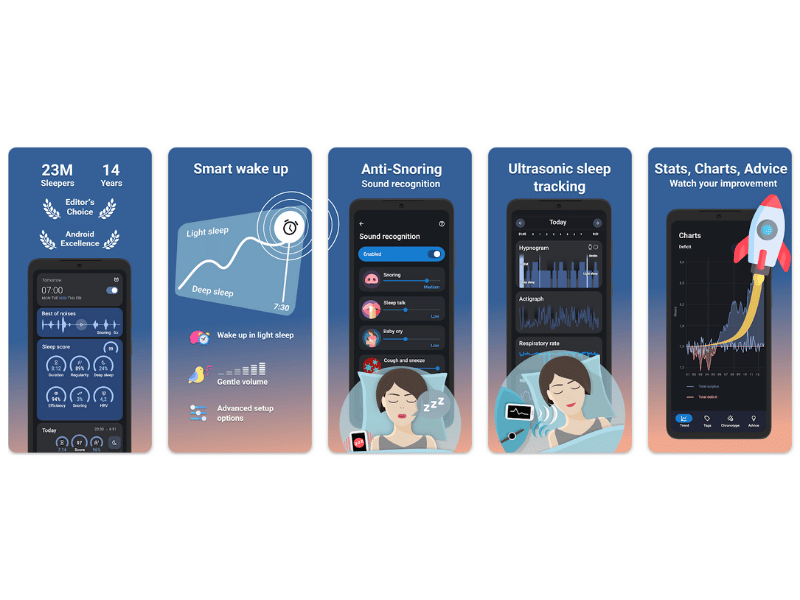
Few sleep-tracking apps are as comprehensive as Sleep as Android. In addition to actually tracking your slumber, it can help you doze off with the sounds of nature, identify the optimum point in your body’s circadian rhythms to wake you up gently, record your snoring and sleep talking.
You can also integrate it with various third-party apps such as Spotify for your sleep playlists, Google Fit, Health Connect, and Samsung Health. It can also be paired with wearable devices if you wish to use one.
Key Features:
Price: Free & Paid versions available
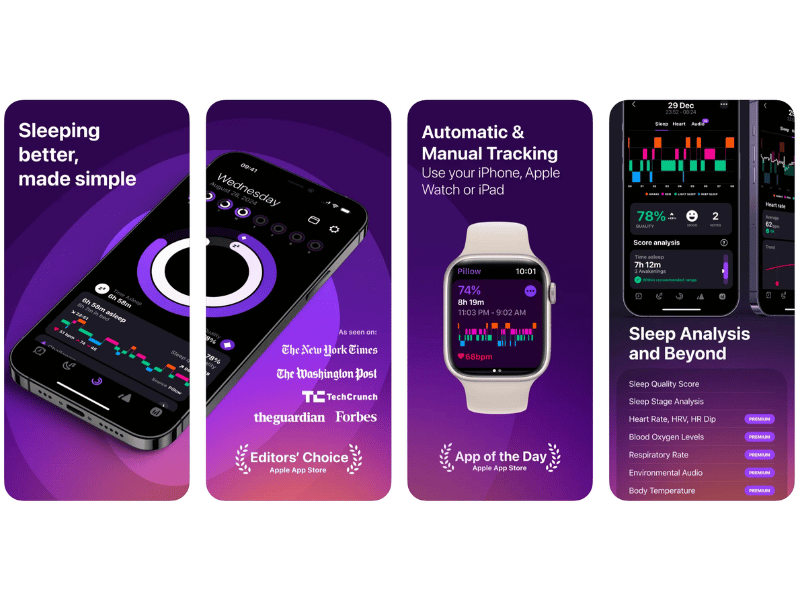
One of the more polished sleep-tracking apps we’ve come across, Pillow can work with an Apple Watch or just an iPhone placed on the bed. It analyzes your movements through the night to record how long you’ve been sleeping for and splits your sleep into three categories: light sleep, deep sleep, and REM sleep.
If you want to study issues like snoring or apnea, the app will also record the noises you make while you sleep and has a smart alarm feature that uses your movements to find the best time (within a preset window) to wake you up in the morning. There’s even a nap mode for those shorter bursts of sleep.
Key Features:
Price: Free & Paid versions available
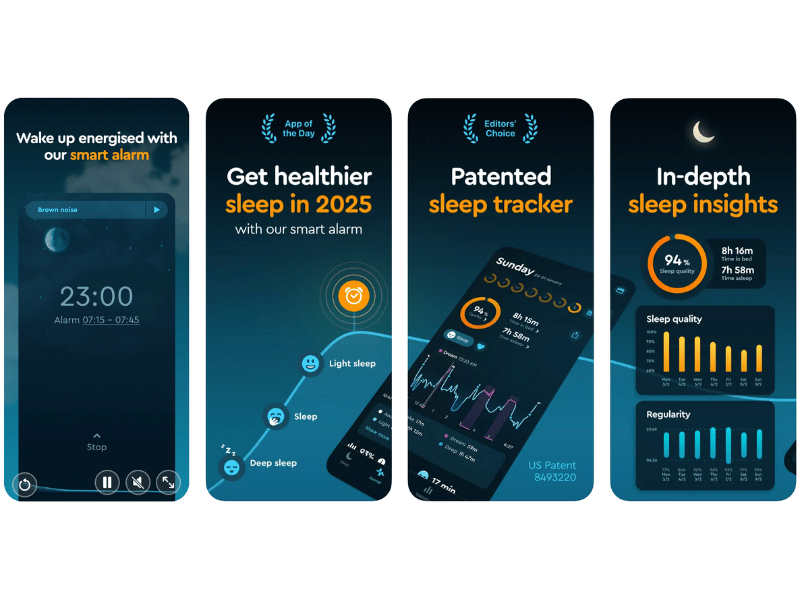
Sleep Cycle is a well-known app that helps users to track their sleep. One of the key features that the app promotes is its smart alarm clock feature. You can customize the time that you want to wake up — immediately or up to 45 minutes. This ensures that you will wake up gently in the light sleep phase rather than abruptly. You may also utilize the snooze function to delay your wake-up time by simply shaking or double-tapping your phone.
The app also tracks your sleep score and allows you to set your own sleep goals. It’s also fully integrated with Apple Health so you don’t need to use an Apple watch if you choose not to.
Key Features:
Price: Free & Paid versions available
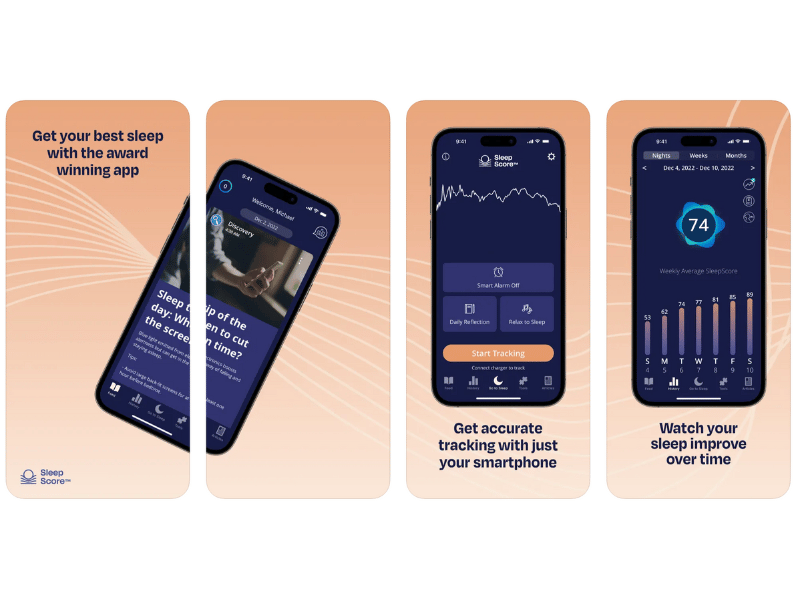
SleepScore can work from your bedside table as well as your mattress, using readings from your phone’s microphone and speaker to judge how well you’re sleeping. The tracking is detailed, too, covering how long it takes you to doze off, and the time you spent in light, deep, and REM sleep.
Sleep score tracks your sleep phases and whether you wake up in the middle of the night by recording your sounds and movements. From here, you will receive a sleep report and tips that can help you improve your sleep cycles. It is also integrated with Apple Health.
Key Features:
Price: Free & Paid versions available
Sleep trackers mainly detect key features such as sleep duration, sleep quality, sleep stages, environmental factors, and lifestyle factors.
However, more often than not, sleep-tracking apps only give a close estimate of your sleep activity rather than provide you with exact data on your sleep patterns. You’ll usually need to do a polysomnography or a sleep study if you want fully accurate data on your sleeping habits and if you have any potential sleep disorders [1].
In that regard, you can track your sleep without a watch using sleep-tracking apps such as the ones listed above. However, it’s important to note that while they may use patented tracking technology and provide over 90% accuracy, it does not compare to doing a full sleep study at a sleep clinic.
Want to know if you may need a sleep study? Take our sleep quiz in ShutEye® app now! Depending on your analyzed results, you may receive recommendations to consult with our sleep specialist. Try it now!
John Hopkins Medicine (n.d.) Do Sleep Trackers Really Work? [online]. Available at: https://www.hopkinsmedicine.org/health/wellness-and-prevention/do-sleep-trackers-really-work